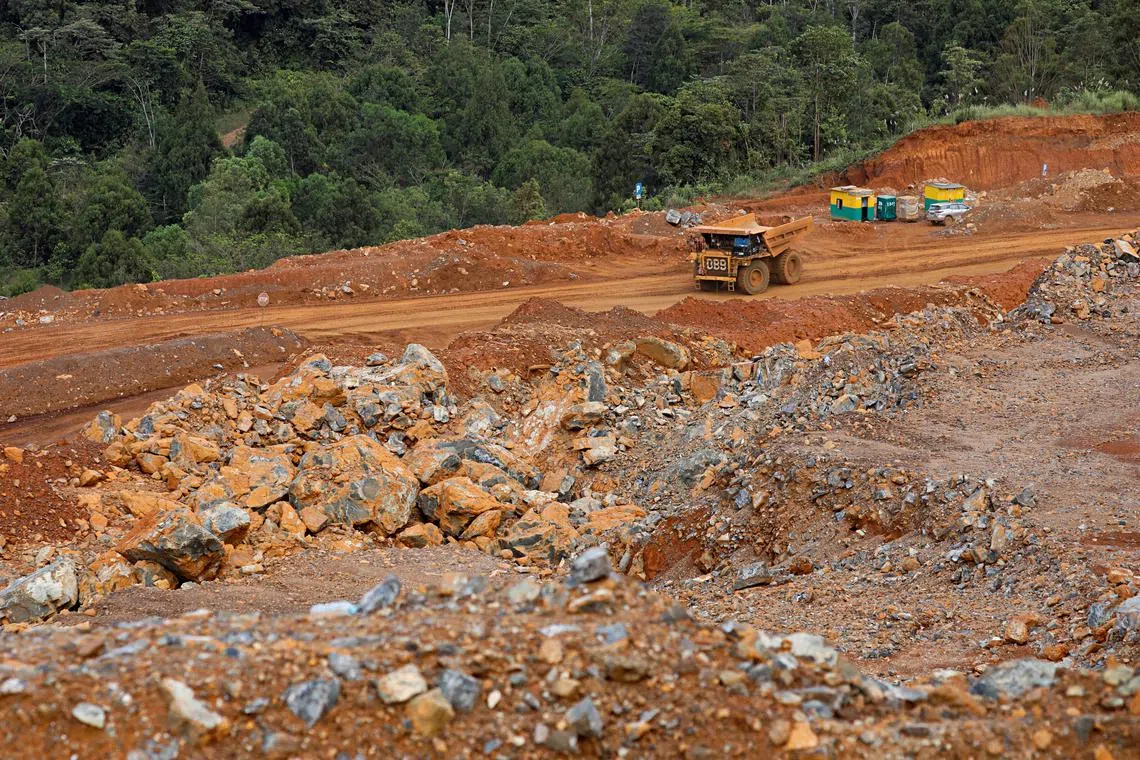Massive blackouts in Sulawesi jeopardise Jokowi’s EV sector push
Sign up now: Get ST's newsletters delivered to your inbox

Nickel is a key component in making lithium-ion batteries, which are widely used in electric vehicles.
PHOTO: REUTERS
JAKARTA – Massive intermittent blackouts have plagued businesses and households on parts of Sulawesi island, as a prolonged drought has dried up reservoirs and slashed hydropower production, straining the power grid.
State utility PLN, which holds a national monopoly on electricity distribution, has been criticised for dragging its feet instead of deploying ready solutions to the electricity shortage.
The dry season prolonged by the El Nino weather phenomenon
According to PLN, South Sulawesi region’s hydropower supply has declined about 75 per cent to about 200 megawatts (MW), compared with mid-2023. The situation is similar in West and South-east Sulawesi provinces.
For Bantaeng Industrial Estate in South Sulawesi, the fallout could extend far beyond the current dry season.
The industrial estate for electric vehicle (EV) battery-related projects is part of a broader strategic national effort championed by President Joko Widodo.
A nickel smelter there has temporarily shut part of its production line due to the electricity shortage.
And at least three foreign investors that had been planning to build nickel processing plants there are considering whether to back out, Bantaeng Industrial Estate director Tony Pahlevi told The Straits Times.
Nickel is a key component in making lithium-ion batteries, which are widely used in EVs.
“We are losing hydropower as reservoirs are drying up,” Mr Tony said. “Tenants here are experiencing power outages for four out of every 24 hours. If this continues until end-year, they will have to lay off workers.
“PLN has only placed hope on cloud-seeding operations. There have been no breakthrough measures such as getting other sources into the electrical grid,” he added.
Cloud seeding entails dispersing potassium iodide or other substances into clouds to induce rain.
PLN did not reply to ST’s request for comments.
Indonesia, which holds the world’s largest nickel ore reserves, has big ambitions to develop its EV ecosystem.
In early 2020, it required all raw nickel extracted in the country to be processed domestically, spurring the growth of its nickel smelting industry and enabling higher value-added export revenues.
More nickel smelting facilities have been built since, with many located on nickel-rich Sulawesi and Halmahera islands.
Bantaeng Industrial Estate’s existing tenants had been operating on 200MW of electricity before the regular blackouts. In 2024, the industrial estate will need an additional 590MW based on expansion plans by existing tenants and applications from potential tenants submitted to the industrial estate, Mr Tony said.
Analysts say the power cuts have dealt a blow to Indonesia’s EV sector push.
“Electricity is basic infrastructure. How can industries grow if there is no guarantee of power supply?” said Mr Yusri Usman, executive director of the Jakarta-based Centre of Energy and Resources Indonesia.
He suggested that PLN use marine vessel gas-fired power plants as a quick fix to the problem, as these vessels can be deployed with less logistical challenges.
“This would be a cheaper and more practical endeavour than deploying diesel generators,” Mr Yusri added.
He accused PLN of being slow in anticipating and mitigating the impacts of El Nino despite earlier warnings of an impending drought.
The weather phenomenon typically brings hot and dry conditions to South-east Asia.
Mr Komaidi Notonegoro, executive director of the Jakarta-based ReforMiner Institute think-tank, agreed that marine vessel gas-fired power plants would be the best solution, given Bantaeng’s proximity to the coast.
Gas is considered blue energy and is cleaner than diesel or coal.
“Some years back, PLN deployed diesel generators to fill a supply gap especially at far-flung areas, but in today’s green age, people would protest against diesel’s very high emissions,” he said.



